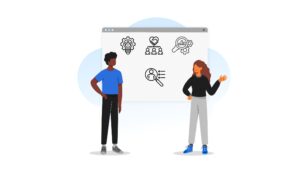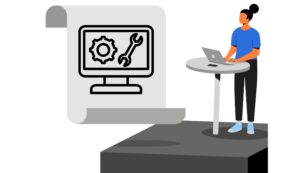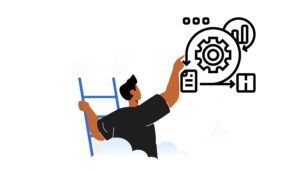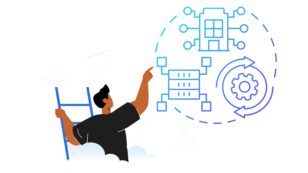Engineering Innovation : How AI Transforms Software Development
If you’re a software developer, you might be looking for ways to work more efficiently. AI comes as a perfect ally, reshaping the way developers create software by automating repetitive tasks, leading to more intelligent and user-focused applications.
In this blog, we’ll uncover how AI and engineering innovation intersect, revealing their profound impact on various stages of the software development life cycle (SDLC).
How AI transforms software development?
Requirement analysis and planning
At the onset of the software development process, requirement analysis and planning are crucial. AI-powered tools and algorithms analyze vast amounts of data to identify user needs, preferences, and pain points. By gaining a deeper understanding of these requirements, developers can make informed decisions about features and functionalities that align with the audience’s needs.
Moreover, AI aids in project planning by efficiently allocating resources, setting manageable timelines, and identifying potential risks. This ensures smoother project execution and enhances the overall development process.
Automation of the code
AI tools like code generators and autocompletion plugins streamline coding by automating repetitive tasks. Additionally, natural language processing (NLP) algorithms simplify coding by converting complex specifications into code snippets that reduce developers’ workloads and enable them to concentrate on critical tasks.
Debugging and bug detection
Finding and fixing software bugs can be quite a hassle. But AI-based debugging tools make it much easier. These tools analyze code and data to spot potential bugs and even suggest ways to fix them, speeding up the process and making the software better. And as the tools learn from past experiences, they get even better over time at catching and solving errors.
Smart testing and quality assurance
AI revolutionizes software testing and quality assurance through smart automation. AI-powered testing tools generate test cases, execute tests across diverse scenarios, and analyze results instantly. This approach boosts test coverage and accuracy to ensure robust outcomes.
Personalized user experience
AI software applications can deliver personalized user experiences by analyzing user data and behavior patterns to tailor content and recommendations to individual preferences. This level of personalization helps users feel more connected, fostering long-term customer relationships.
By enhancing user engagement and satisfaction, AI applications increase the likelihood of retaining customers over the long term.
Predictive analytics
AI can analyze large datasets to uncover patterns that offer valuable insights. This predictive analytics capability can assist software developers and businesses in decision-making, identify potential risks, and optimize processes.
For predictive analytics, AI uses machine learning (ML) algorithms and models that learn from data over time. Once trained on historical data, these models can detect patterns and relationships. When applied to new or unseen data, they can predict future outcomes. For example, by analyzing past user behavior, a model can forecast future purchasing patterns.
Software maintenance
AI can support software maintenance by detecting and resolving issues without human intervention. This approach, known as self-healing software, reduces downtime and allows developers to focus on more critical tasks requiring manual effort.
This autonomous maintenance contributes to cost savings by reducing the need for manual oversight and lowering operational overhead. This approach can also lead to faster response times, which enhance the overall user experience and customer satisfaction. By automating these routine maintenance tasks, organizations can improve system reliability and reduce the risk of service disruptions.
Conclusion
The future of software development looks promising as AI plays a major role in automating tasks. With AI handling basic coding, automated testing, and system maintenance, developers can focus on more complex challenges like design and innovation, which AI can’t replicate.
By working alongside AI, developers can create software that is smarter, more efficient, and better suited to users’ needs. The partnership between AI and human developers will drive progress in the industry, leading to new and exciting possibilities. Those who adapt to these changes and use AI to their advantage will thrive. Ultimately, the future of software development is about AI and developers working together to create better technology.
Tell us the skills you need and we'll find the best developer for you in days, not weeks.











